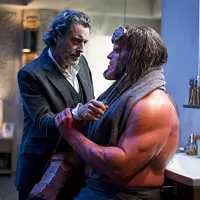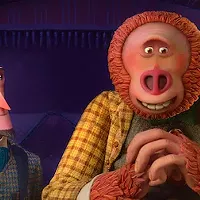

ANNIE HALL (1977) / MANHATTAN (1979). Woody Allen has had many comebacks throughout the course of his latter-day career, but after a particularly lengthy rough patch that mostly saw movies on the order of the instantly forgotten Cassandra's Dream (Never heard of it? My point exactly) and the truly awful You Will Meet a Tall Dark Stranger, it was startling to see Midnight in Paris not only emerge as a major Oscar player but, more shockingly, as Woody's biggest commercial hit.
Yet for the majority of his fans, nothing will ever touch Annie Hall, the masterpiece that elevated him from being one of our brightest comedians to taking his place as an artistic genius. Thirty-five years later, the film still has the ability to break down all defenses with its wonderful mix of humor and heart, as the neurotic Alvy Singer (Allen) reflects on his relationship with the equally neurotic Annie Hall (Diane Keaton). Picking out a favorite sequence - the lobster scene, the Marshall McLuhan cameo, Alvy's dinner with the Hall family (look for Christopher Walken as Annie's disturbed brother Duane), his childhood recollections - is about as impossible as selecting a favorite line of dialogue (although I've admittedly always been partial to the description of the spider that's "the size of a Buick"). While Star Wars cleaned up in the technical categories, Annie Hall laid waste to the major Academy Awards, winning for Best Picture, Actress (Keaton's performance is fantastic), Director and Original Screenplay (Allen scripted with Marshall Brickman).
Allen followed Annie Hall with 1978's somber, Bergman-esque drama Interiors before returning to the laughs with Manhattan. Every one of Allen's New York-set films is a valentine to the Big Apple, but none more than this one, which even opens with Gordon Willis' gorgeous black-and-white cinematography taking in the city while backed by the sounds of George Gershwin. Like Annie Hall, Manhattan can also be labeled a romantic comedy, but it's entirely more cynical and cautious in its approach to relationships, as Isaac (Allen), still smarting over the fact that his ex-wife (Meryl Streep, in the same year she won her first Oscar for Kramer vs. Kramer) left him for another woman, enjoys a romance with a 17-year-old high school student (Oscar-nominated Mariel Hemingway) before finding himself attracted to an initially abrasive woman (Keaton) who's presently involved with his married best friend (Michael Murphy).
Blu-ray extras solely consist of each film's theatrical trailer.
Annie Hall: ****
Manhattan: ***1/2
THE APARTMENT (1960). A year after collaborating on the immortal Some Like It Hot, writer-director-producer Billy Wilder, co-writer I.A.L. Diamond and star Jack Lemmon re-teamed for The Apartment, another screen gem that attained classic status in about as much time as it takes to comb one's hair. Yet such instant accolades were nothing more than a work of art receiving its proper due, and even 52 years later, this brilliant comedy has lost none of its luster. Lemmon stars as C.C. Baxter, an office underling who finds himself on a career trajectory toward executive status thanks to his compliance in allowing his apartment to be used by company superiors looking for a secluded place to take their mistresses. A bachelor with no friends or lovers, Baxter takes a liking to elevator operator Fran Kubelik (Shirley MacLaine) and is understandably upset when he discovers that she's the latest conquest of company bigwig and married man Jeff Sheldrake (Fred MacMurray). A tender, tentative romance that's also a scathing look at office politics, The Apartment primarily works because of the achingly heartfelt performances by Lemmon and MacLaine. Nominated for 10 Academy Awards, it won five, including Best Picture, Director and Original Screenplay.
Blu-ray extras include audio commentary by film historian Bruce Block; a making-of piece; and a short piece on Lemmon.
Movie: ****
COLD MOUNTAIN (2003). Anthony Minghella's adaptation of Charles Frazier's novel places a sweeping romance against the backdrop of the Civil War, yet this handsome epic turns out to be least compelling when it focuses on the fluttering hearts of its protagonists, a Confederate soldier and the woman he left behind. Individually, the performances by Jude Law and Nicole Kidman are fine, yet their scenes together deliver little kick. Fortunately, most of the movie keeps the pair apart, with the wounded soldier making his way back to his North Carolina hometown so they can be reunited. His trek is slowed by his encounters with various characters, and these entertaining interludes spark the picture; so, too, do the sequences back home, thanks to the arrival of a feisty pioneer woman. Renee Zellweger plays this firecracker like a person strung out on eight pots of coffee and two hours of sleep, and it's her Oscar-winning performance — forceful, passionate, funny, and, yes, somewhat over the top — that cuts through the occasional sheen of stuffy self-importance, thus ensuring that this Mountain never deteriorates into a molehill of unrelenting melancholy. Along with some trusty veterans like Donald Sutherland and Eileen Atkins, the supporting cast is a veritable who's-who of stars on the ascendancy: Natalie Portman, Philip Seymour Hoffman, Brendan Gleeson, Cillian Murphy, Emily Deschanel, and more.
Blu-ray extras include audio commentary by Minghella and editor Walter Murch; deleted scenes; two making-of specials; and a concert featuring musical and spoken-word performances by those involved with the film.
Movie: ***
DRIVE (2011). The latest in a long line of silent anti-heroes as the ultimate in celluloid cool, Ryan Gosling plays a character known only as Driver. He's employed as a wheelman for crooks, but that's merely the least reputable of his three jobs: When he's not working on the wrong side of the law (as illustrated in a spectacular opening set-piece), he's a movie stunt driver as well as a mechanic in a garage owned by the shady Shannon (Bryan Cranston). Shannon is his link between all three jobs, which becomes problematic once they get involved with a pair of high-end criminals with notable cruel streaks: Bernie Rose (Albert Brooks), a former Hollywood producer, and his crude partner Nino (Ron Perlman). Causing even further complications is Driver's growing affection for his neighbor Irene (Carey Mulligan), who has a young son (Kaden Leos) in her care and a husband (Oscar Isaac) on the way home from the clink. Danish director Nicolas Winding Refn has fashioned a work that's as slick as its protagonist: Its muted Euro-sheen mingles easily with its American atmospherics, and it's all punctuated by bouts of brutal and unsightly gore that never feel like exploitive overkill but instead serve to feed the urgency of the moment. Aside from a curiously miscast Mulligan, the entire supporting roster is strong, although Brooks deserves his own standing ovation. The nebbish from Broadcast News and Lost in America has been reconfigured as a slow-burning sadist, and it's a sight to chill the spine. Drive is such a sterling achievement for most of its running time that it's alarming when it crashes and burns during its final 15 minutes. After approximately 90 minutes of careful buildup, the end feels maddeningly rushed, with the actions of various characters bordering on the illogical and their fates succumbing to genre expectations. This unfortunate turn of affairs doesn't irreparably damage the overall package, but it does leave its mark, as surely as oil leaking from a rusty pickup puttering down the highway.
Blu-ray extras include an interview with Refn and four featurettes, including one on the character of Driver and another on the stuntwork.
Movie: ***
THE ENGLISH PATIENT (1996). Along with Out of Africa and Dances with Wolves, The English Patient has over time emerged as one of the most undervalued of all Best Picture Oscar winners, largely because it had the audacity to beat the infinitely more hip (and also brilliant) Fargo for the statue. Michael Ondaatje's award-winning novel was one of those works that was deemed "unfilmable," yet that didn't stop producer Saul Zaentz (Amadeus, One Flew Over the Cuckoo's Nest) and writer-director Anthony Minghella from giving it their best shot. The resultant bull's-eye exceeded anyone's expectations: Here was the sort of lush, literate epic rarely seen in contemporary cinema, a throwback to those old-fashioned spectacles in which intimate romances are played out against the backdrop of earthshaking events. In this case, the defining conflict is World War II, and Minghella's script expertly moves back and forth between two interconnected storylines separated by time and distance: the steamy relationship between a Hungarian explorer (Ralph Fiennes) and a married Englishwoman (Kristin Scott Thomas), and the tender one between the now-dying Hungarian and a French-Canadian nurse (Juliette Binoche). There are images in this movie that are unforgettable (hats off to cinematographer John Seale), yet its real power rests in the complexity of its characters and the resonance of its themes involving betrayal, retribution and absolution. As the sensitive Hana, Binoche delivers one of the most incandescent performances I've ever had the pleasure to watch; she deservedly earned one of the film's nine Academy Awards.
Blu-ray extras include audio commentary by Minghella, Zaentz and Ondaatje; deleted scenes; interviews with the cast and crew; a making-of piece; and a historical look at the real Count Almasy (Fiennes' character).
Movie: ****
GODZILLA (1954). Criterion's two-disc edition is notable for a pair of reasons: It not only includes the original, uncut version of the immortal monster movie (not released in the United States until 2004), it also contains the more familiar American re-edit, thus allowing viewers the opportunity to see how and why drastic changes were made before its US launch. When Gojira (a.k.a. Godzilla) premiered in Japan in 1954, it was hardly viewed as a campy monster movie. Instead, this tale about a rampaging behemoth terrorizing Tokyo was its makers' fantasy-veiled look at the evils of nuclear power — a direct statement against the bombings of Hiroshima and Nagasaki that had marked the final chapter of World War II nine years earlier. The film was an enormous success in Japan, but before it reached our shores, American distributors knew some changes had to be made. Gone were almost all references to Japan's recent H-bomb annihilation, as well as numerous talky sequences that were believed would hurt the picture's stateside success. Trimming close to 40 minutes from the 98-minute original, its US handlers then added 20 minutes of newly shot footage featuring Raymond Burr as an American reporter passing through Tokyo at the time of Godzilla's reign of terror. This version opened in America in 1956 under the title Godzilla, King of the Monsters! and went on to become an international smash. Certainly, the American cut works well enough as a typical example of the sort of sci-fi yarns being produced during the '50s, yet it's the more somber Japanese version that resonates as a true tale of horror rather than just another creature feature.
DVD extras include audio commentary on both versions by film historian David Kalat; a look at the film's photographic effects; new interviews with actors Akira Takarada and Haruo Nakajima and special effects technicians Yoshio Irie and Eizo Kaimai; and an interview with Japanese film critic Tadao Sato.
Gojira: ***
Godzilla, King of the Monsters!: **1/2
REBECCA (1940) / SPELLBOUND (1945) / NOTORIOUS (1946). Much to the impatience of cinephiles, there are only a mere three Alfred Hitchcock titles available on Blu-ray — Psycho, North By Northwest and The Lady Vanishes — but that number has doubled with the releases of this more-than-welcome trio. (Plus, look for The Birds and To Catch a Thief later this year.)
Made under the auspices of producer David O. Selznick (Gone With the Wind), Rebecca was Hitchcock's first Hollywood movie, and it proved to be a potent calling card. In this adaptation of Daphne du Maurier's novel, Laurence Olivier and particularly Joan Fontaine are effective as the brooding Maxim de Winter and his timid second wife, but the real show-stopper remains Judith Anderson's formidable turn as Mrs. Danvers. Slinking through the halls of the Manderlay estate like a giant black widow, this creepy housekeeper, still in love with the former — and now deceased — mistress of the house (the Rebecca of the title), does everything in her power to drive the new Mrs. de Winter mad. Nominated for 11 Academy Awards, this won for Best Picture (although Hitchcock himself lost Best Director) and Best Black-and-White Cinematography.
A commercial and critical hit in its day, Spellbound has seen its standing slip in the ensuing decades, as it's never mentioned on any list of Hitchcock's best works. That's a shame, because this fascinating thriller about a psychiatrist (an excellent Ingrid Bergman) who falls in love with an amnesiac (Gregory Peck, emerging as a superstar in just his second year in film) who might be guilty of murder has plenty to recommend it, including a tremendous Miklos Rozsa score (featuring an early use of the theremin) and a superb dream sequence designed by Salvador Dali. Nominated for six Academy Awards (including Best Picture and Best Director), this won Best Original Score for Rozsa's haunting soundtrack.
Second only to Psycho as my favorite Hitchcock movie, Notorious is notable for featuring what are arguably Ingrid Bergman's best performance and Cary Grant's finest dramatic work (and in both cases, that's saying a helluva lot). Bergman is cast as a "tainted" woman who aids an American government agent (Grant) by infiltrating a Nazi spy ring and wooing its most vulnerable member (supporting actor extraordinaire Claude Rains). A brilliant motion picture that resonates on any number of levels, this gem not only expounds on the sadomasochistic sacrifices that individuals make in the name of love but also on the duplicitous nature that often occurs in matrimonial situations. This masterpiece deservedly earned Oscar nods for Best Supporting Actor (Rains) and Best Original Screenplay (Ben Hecht), but nothing for Hitchcock and his leads.
Blu-ray extras on Rebecca include audio commentary by film critic Richard Schickel; a making-of piece; the featurette The Gothic World of Daphne du Maurier; audio interviews with Hitchcock; and screen tests. Blu-ray extras on Spellbound include audio commentary by film professors Thomas Schatz and Charles Ramirez Berg; a piece on the collaboration between Hitchcock and Dali; the featurette Guilt by Association: Psychoanalyzing Spellbound; and an audio interview with Hitchcock. Blu-ray extras on Notorious include audio commentary by film professor Rick Jewell; separate audio commentary by film professor Drew Casper; a making-of piece; the featurettes Alfred Hitchcock: The Ultimate Spymaster and The American Film Institute Award: The Key to Hitchcock; and audio interviews with Hitchcock.
Rebecca: ****
Spellbound: ****
Notorious: ****


